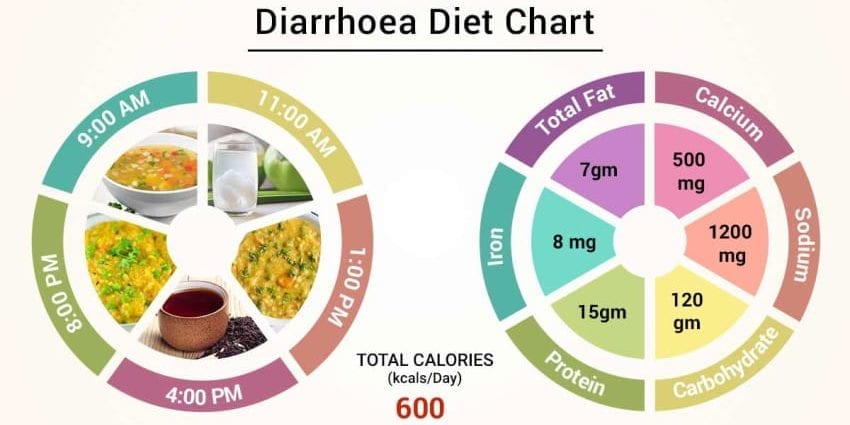General description of the disease
Diarrhea is a symptom of a bowel disorder (diarrhea) characterized by frequent loose stools.
Causes of acute diarrhea:
drinking contaminated unboiled water, allergies to medicines or food, lactose or other food intolerance, bacterial, parasitic or viral intestinal infection (amoebiasis, food poisoning, stomach flu), emotional distress and stress.
The causes of chronic diarrhea:
Crohn’s disease, irritable bowel syndrome, chronic inflammation, ulcerative colitis, rectal and colon ulcers, malabsorption syndrome, rectal cancer.
Diarrhea symptoms:
frequent stools, high body temperature, nausea, vomiting, blood in the stool, severe persistent abdominal pain, dehydration (thirst, dry tongue and lips, rare urination, rapid breathing).
Healthy foods for diarrhea
A diet for diarrhea aims to restore the intestinal microflora and resume its function to absorb excess fluid. Diet No. 4 is usually recommended, which aims to calm the mucous membrane, reduce fermentation processes in the intestines. Food should be steamed or boiled and wiped and should include warm, semi-liquid and liquid foods. Thus, limiting the effects on the intestines of chemical, mechanical and thermal irritants.
In the first few hours of the development of diarrhea, special attention should be paid to the drinking regimen, since the disease greatly dehydrates the body, “washes out” minerals and salts. Drinks with useful properties for diarrhea include: apple juice, black tea with lemon juice, herbal tea, tea made from raspberry leaves, salt solutions “Regidron”, “Gastrolit”, warm alkaline non-carbonated mineral water, decoctions of raisins, blueberries, rose hips …
Among the products, the most useful are:
- boiled white rice (poor in fiber and has “bonding” properties), use half a cup every two hours;
- banana (rich in potassium, which is “washed out” from the body with diarrhea), consume two bananas after 4 hours;
- liquid porridge on water (buckwheat, rice, oatmeal, semolina);
- white bread in the form of crackers;
- soft-boiled eggs, steam omelet, grated cottage cheese – to replenish proteins;
- boiled, grated, baked apples (contain pectin, tannin and organic acids, which binds toxins, helps restore intestinal microflora);
- grated carrots and carrot puree (contains vitamin A, which improves the condition of the intestinal mucosa and has an adsorbing effect);
- “Slimy” soups with meatballs in low-fat fish / meat broth;
- Lean fish and meat without bones, tendons, and skin (such as steamed patties)
- vegetable broths and mashed potatoes;
- jelly and jelly from blueberries, pears, bird cherry and quince.
Early breakfast: oatmeal, unsweetened green tea.
Late breakfast: quince compote.
Dinner: rice broth, buckwheat porridge on the water, steamed meatballs, jelly.
Afternoon snack: rosehip decoction.
Dinner: steam omelet and tea.
At night: jelly.
Folk recipes for diarrhea
- to replenish the water-salt balance of the body, you can use the following “cocktail”: half a liter of water, one quarter of a teaspoon of salt, one quarter of a teaspoon of soda, two tbsp. spoons of honey, take 1,5 liters per day;
- with bacterial diarrhea: half a teaspoon of garlic juice every two hours;
- canned or fresh aloe juice – take two tablespoons three times a day half an hour before meals;
- birch tincture (pour half a bottle of birch buds with vodka, cork tightly, leave for a month in a warm place, shaking occasionally), take 40 drops three times a day;
- juice from the herb of shepherd’s purse take 40 drops per fifty grams of vodka in two steps;
- fresh bird cherry juice;
- bird cherry broth (15 grams of bird cherry per 200 milliliters of water, boil for 5 minutes, insist) take in two doses.
Dangerous and harmful foods for diarrhea
Limit intake of citrus juice, pineapple juice, or tomato juice, which additionally irritate the intestines. And also, foods that aggravate the symptoms of diarrhea: convenience foods, fatty foods, sweets, sugar, chewing gums, drinks with sorbitol, coffee, milk, legumes, black bread and baked goods, beets, sauerkraut, cucumbers, radishes, plums, radishes , fruit juices, grapes, yoghurts, cream, fermented baked milk, cottage cheese, kefir, cheese, fatty meats, poultry, fish, caviar, concentrated fish and meat broths, alcohol, pasta, millet and barley groats, pickled, smoked, salted and canned foods (sausages, sausage, brisket, pickled cucumbers and tomatoes, olives), honey, jam, chocolate, raw fruits, fried or hard-boiled eggs, sauces, spices and spices.
Attention!
The administration is not responsible for any attempt to use the information provided, and does not guarantee that it will not harm you personally. The materials cannot be used to prescribe treatment and make a diagnosis. Always consult your specialist doctor!










